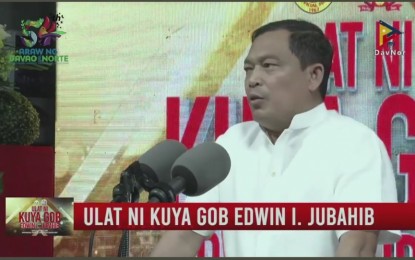
Davao del Norte Governor Edwin Jubahib delivering his State of the Province Address on Thursday (July 1, 2021). (Screengrab from the live-streamed address)
DAVAO CITY – Davao del Norte Governor Edwin Jubahib cited the province’s significant gains from “DavNor KAAGAPAY".
Speaking during his State of the Province Address (SOPA) on July 1, Jubahib said “DavNor KAAGAPAY”, which stands for Kawsa sa Agrikultura ug Panginabuhian sa Barangay Program, is a “complete package” that ensures food, livelihood, and environmental protection among the Dabaonons.
In his televised speech, he said the program was implemented out of the need for sufficient food during the coronavirus disease 2019 (Covid-19) pandemic.
The focus on agriculture, Jubahib said, resulted in a significant increase in rice production, reaching 197,821 metric tons (MT) by 2020 or about 70.95 percent rice sufficiency level compared to the 60.87 percent last year.
“More than 200 kilos of various kinds of vegetable seeds are distributed to nearly 20,000 families in the province,” he said.
Under the KAAGAPAY Program, the 68,963-sq. meter area of some 1,015 families has produced 111 MT of vegetables.
“It has increased the income by PHP2,009 per household. We also trained 88 KAAGAPAY staff to teach the beneficiaries about vegetable gardening,” Jubahib said.
He added that the provincial government has already provided hundreds of thousands of coffee beans, cardava, abaca, coconut, camote, mahogany, and falcata to the Indigenous Peoples (IP) in Talaingod and Kapalong towns.
“We help farmers affected by low prices on grains during the pandemic. We directly buy their produce at a reasonable price from PHP15 to PHP19 per kilo. With PHP3 million capital, we purchased 484,297 kilos of rice paddy and supported about 115 farmers,” he said.
A total of 24,242 bags of inbred rice seeds were distributed to 16,638 farmers, 1,000 bags of inorganic fertilizer (1,000 farmers), 266 bags of hybrid corn seeds and 150 bags of sweet corn (250 farmers), 125 bags of inorganic fertilizers, 5,380 asexually-propagated fruit trees (40 farmers), 20,300 Trichogramma cards, 2,148 liters of biopesticides, and 37,882 packs of Trichoderma to 2,413 farmers.
Farm machinery, facilities
Jubahib noted that up to PHP36.47 million in farm machinery and facilities were also provided by farmers' associations and coops being funded by the Rice Competitiveness Enhancement Fund (RCEF) of the Department of Agriculture. He said the province obtained more than 300 tons of sorghum seeds from the Texas-based Scott Seed Corp. through the Mindanao Development Authority (MinDA), which were planted in CADT areas and in bananas affected by Fusarium Wilt.
“Nearly 400,000 livestock of 12,485 farmers have been serviced by across the province. We set up a Livestock and Poultry Multiplier Farm in Sitio Salawao, Talaingod under our DavNor KAAGAPAY program. With just the initial 420 breeders of free-range chicken, we have already produced 12,912 chicks that we have distributed in various barangays,” he said.
Solving deforestation
Meanwhile, to prevent deforestation, Jubahib said the province has planted 232,947 forest and fruit trees in 251.43 hectares of the watershed, buffer zones, and landslide-prone areas.
“We also planted mangroves on six acres along the sea coast. We also produced 120,000 varieties of forest tree seedlings, in support of the DavNor KAAGAPAY program,” he added.
As the province focuses on the "total log ban", Jubahib said more than 100,000 board feet of forest products worth PHP2.1 million have been seized.
“We sincerely thank our local chief executives, who enthusiastically provide their consistent support of our programs and deliver genuine service to the people. Also, to our government line agencies, non-government organizations, private and business sectors, religious, academe, farmers, workers, and other sectors of our society,” he said. (PNA)
